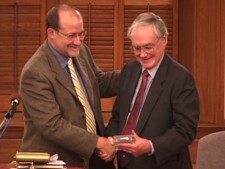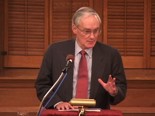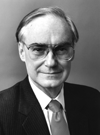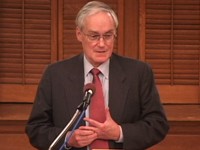Today's Problems "Momentary Nuisances" Says Wall Street Journal Editor Robert Bartley, First Recipient of Kilgore Medal
September 26, 2002
 September 26, 2002, Greencastle, Ind. -
September 26, 2002, Greencastle, Ind. - ![]() [DOWNLOAD VIDEO: "The Kilgore Medal" 647KB] "That's something I'll really treasure, because I admire this man ... I can think of nothing better than to have an award to me named after him," said Robert Bartley, editor of the Wall Street Journal, tonight as he received the inaugural Bernard C. Kilgore Medal for Distinguished Lifetime Achievement in Journalism. The award was presented by DePauw University Vice President for Academic Affairs and Dean of the Faculty Neal Abraham as Bartley spoke on "Three Decades of Progress, Mostly" in Meharry Hall of historic East College. Kilgore, the former managing editor of the Journal and a 1929 graduate of DePauw, was named "Business Journalist of the Century," and is one of a number of DePauw alumni with ties to the internationally-read and respected newspaper.
[DOWNLOAD VIDEO: "The Kilgore Medal" 647KB] "That's something I'll really treasure, because I admire this man ... I can think of nothing better than to have an award to me named after him," said Robert Bartley, editor of the Wall Street Journal, tonight as he received the inaugural Bernard C. Kilgore Medal for Distinguished Lifetime Achievement in Journalism. The award was presented by DePauw University Vice President for Academic Affairs and Dean of the Faculty Neal Abraham as Bartley spoke on "Three Decades of Progress, Mostly" in Meharry Hall of historic East College. Kilgore, the former managing editor of the Journal and a 1929 graduate of DePauw, was named "Business Journalist of the Century," and is one of a number of DePauw alumni with ties to the internationally-read and respected newspaper.
![]() [DOWNLOAD AUDIO: "Together, Not Apart" 109KB] "In 2002, society is not coming apart, it's coming together, despite its difficulties," said Bartley, who has overseen the Wall Street Journal's editorial page since 1972, and will retire at the end of the
[DOWNLOAD AUDIO: "Together, Not Apart" 109KB] "In 2002, society is not coming apart, it's coming together, despite its difficulties," said Bartley, who has overseen the Wall Street Journal's editorial page since 1972, and will retire at the end of the  year. He says the current woes facing the nation and the world "look trivial" when compared to what was happening when he took the reigns thirty years ago. Bartley says stagflation, Watergate, OPEC's rise, the Vietnam War, a growing Soviet threat, and terrorism at the Olympic Games in Munich created a climate where "society was in the process of becoming unglued."
year. He says the current woes facing the nation and the world "look trivial" when compared to what was happening when he took the reigns thirty years ago. Bartley says stagflation, Watergate, OPEC's rise, the Vietnam War, a growing Soviet threat, and terrorism at the Olympic Games in Munich created a climate where "society was in the process of becoming unglued."
Today's headlines -- a sagging economy, the new threat of terrorism, and corporate fraud -- pale by comparison, Bartley told the Kilgore Honorary Lecture, sponsored by the Media Fellows program. ![]() [DOWNLOAD AUDIO: "Momentary Nuisances" 704KB] "What I think I've learned over three decades is that rationality wins out, that progress happens [and] that ultimately optimism pays. In human affairs, nothing is ever solved completely, of course, but don't wish for the good old days," the veteran editor said. "In 1972, problems were worse.
[DOWNLOAD AUDIO: "Momentary Nuisances" 704KB] "What I think I've learned over three decades is that rationality wins out, that progress happens [and] that ultimately optimism pays. In human affairs, nothing is ever solved completely, of course, but don't wish for the good old days," the veteran editor said. "In 1972, problems were worse.  Yet we did overcome communism, we solved stagflation, we went through Watergate... and having succeeded in all of that, surely this society can deal with the challenges of 2002. In the sweep of three decades, today's problems loom as ... momentary nuisances," he said.
Yet we did overcome communism, we solved stagflation, we went through Watergate... and having succeeded in all of that, surely this society can deal with the challenges of 2002. In the sweep of three decades, today's problems loom as ... momentary nuisances," he said.
America is, in the wake of the events of September 11, 2001, "in a new and serious mood," Bartley says. He noted that after the terrorist attacks, ![]() [DOWNLOAD AUDIO: "No Yellow Ribbons" 869KB] "there were no yellow ribbons. [They've] been the conventional thing when we had hostages in Iran and so on. Instead, we had a spontaneous display of American flags. As I look at this, I have to conclude that the 'Vietnam Syndrome' of 1972 has finally been extinguished. Here and there, Susan Sontag or Oliver Stone waves the old 'blame America first' rallying cry, that the sins of the world are all the fault of America. But now they're being hooted down even by the left. And I think there could be no more hopeful sign about our ability as the sole superpower to lead in constructing a new, and ultimately, more peaceful world order," Bartley said.
[DOWNLOAD AUDIO: "No Yellow Ribbons" 869KB] "there were no yellow ribbons. [They've] been the conventional thing when we had hostages in Iran and so on. Instead, we had a spontaneous display of American flags. As I look at this, I have to conclude that the 'Vietnam Syndrome' of 1972 has finally been extinguished. Here and there, Susan Sontag or Oliver Stone waves the old 'blame America first' rallying cry, that the sins of the world are all the fault of America. But now they're being hooted down even by the left. And I think there could be no more hopeful sign about our ability as the sole superpower to lead in constructing a new, and ultimately, more peaceful world order," Bartley said. 
The man who's been called the most influential editorial writer in America says he believes President Bush should push forward with an effort to oust Iraq's Saddam Hussein, stating, ![]() [DOWNLOAD AUDIO: "Removing Saddam" 193KB] "Nothing could do more to change the face of the Middle East and advance the cause of peace there." A vocal supporter of Ronald Reagan's supply-side economics (he says Reagan's tax cuts sparked the economic boom of the mid-80's and authored the book, The Seven Fat Years: And How To Do It Again), Bartley thinks Bush should follow the lead.
[DOWNLOAD AUDIO: "Removing Saddam" 193KB] "Nothing could do more to change the face of the Middle East and advance the cause of peace there." A vocal supporter of Ronald Reagan's supply-side economics (he says Reagan's tax cuts sparked the economic boom of the mid-80's and authored the book, The Seven Fat Years: And How To Do It Again), Bartley thinks Bush should follow the lead. ![]() [DOWNLOAD AUDIO: "Tax Cuts" 217KB] "The President, in the last couple days, has been talking about making the tax cuts permanent. I would do more. I would accelerate them, stretch them out." And, Bartley says,
[DOWNLOAD AUDIO: "Tax Cuts" 217KB] "The President, in the last couple days, has been talking about making the tax cuts permanent. I would do more. I would accelerate them, stretch them out." And, Bartley says, ![]() [DOWNLOAD AUDIO: "World Monetary System" 261KB] "I think we have to do something about the world monetary system ... These extreme fluctuations between the dollar and the Euro and the Yen have a destablizing effect on the world economy."
[DOWNLOAD AUDIO: "World Monetary System" 261KB] "I think we have to do something about the world monetary system ... These extreme fluctuations between the dollar and the Euro and the Yen have a destablizing effect on the world economy."
Robert Bartley writes the "Thinking Things Over" column, which appears each Monday on the Wall Street Journal's opinion pages, and contributes to OpinionJournal.com, the newspaper's free editorial Web site. He joined the Journal in 1962 and served as a staff reporter in Chicago and Philadelphia before  moving to New York. Bartley won a Pulitzer Prize for editorial writing in 1980, and also received a Gerald Loeb Award and a Citation for Excellence from the Overseas Press Club of America.
moving to New York. Bartley won a Pulitzer Prize for editorial writing in 1980, and also received a Gerald Loeb Award and a Citation for Excellence from the Overseas Press Club of America.
Noting that he was honored to be at DePauw, Robert Bartley added, ![]() [DOWNLOAD AUDIO: "Bartley on Kilgore" 675KB] "I go back far enough that I did meet Barney Kilgore once and shake hands with [him] ... We live today off his legacy at the Wall Street Journal. He was a genius who brought the Wall Street Journal from a small financial publication into a national and now international institution, taking the circulation from about 75,000 at the end of World War II to about a 1.3 million at the time he died in 1967. He continues to influence our work every day."
[DOWNLOAD AUDIO: "Bartley on Kilgore" 675KB] "I go back far enough that I did meet Barney Kilgore once and shake hands with [him] ... We live today off his legacy at the Wall Street Journal. He was a genius who brought the Wall Street Journal from a small financial publication into a national and now international institution, taking the circulation from about 75,000 at the end of World War II to about a 1.3 million at the time he died in 1967. He continues to influence our work every day."